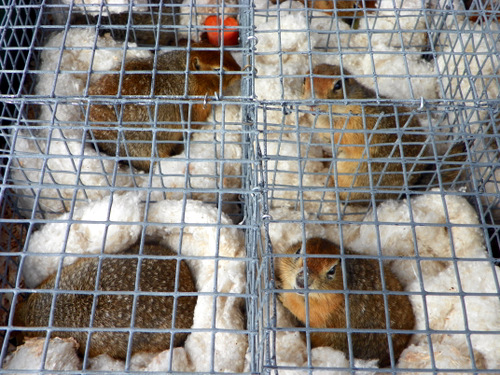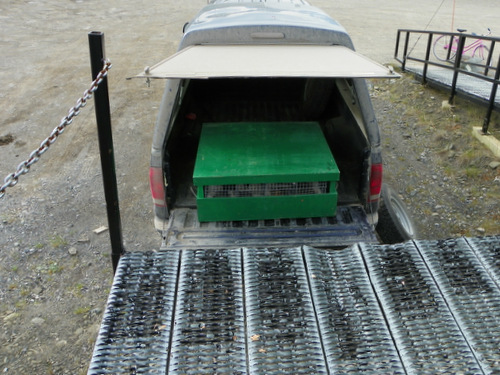I love walking around this place! On my way to the restroom this morning I stopped by the loading dock of the winter lab to lend a hand loading a pallet onto a truck. But nothing is ordinary at Toolik, and this particular pallet housed 16 arctic ground squirrels on their way to Fairbanks. Another group from the University of Alaska Fairbanks was collecting squirrels for studies on circadian rhythms and bone density.
 Traveling arctic ground squirrels.
Traveling arctic ground squirrels.
Your Body Clock
Circadian rhythms are your "body clocks" that run on 24 hour cycles. Environmental factors can have a significant influence on these rhythms. It's partly why sleeping and eating patterns are thrown off due to jet lag. Sun rise also plays a role in these rhythms. While the sun has not set the entire time I've been here, there is still a noticeable difference between day and night. The sun is much lower in the sky around 2:00 AM. The temperature also drops around this time. Many people here, including me, have noticed that they seem to require less sleep under these conditions of constant daylight.
People who study birds typically have to get up very early at lower latitudes because it is the most active time of day for birds. I've heard differing opinions on this subject in the arctic from individuals who observe birds. Some groups, like Trevor and Adeline from my June 15 journal, head out at "sunrise" around 2:00 AM much as they would in locations where the sun actually sets. Other bird researchers go into the field later in the day, saying that time of day has little effect on bird activity here. I still remember finding it strange to hear birds chirping throughout the entire night while trying to sleep when I first arrived at camp. Reindeer and ptarmagins are two examples of arctic animals that do not exhibit circadian rhythms during periods of 24 hour daylight. Arctic ground squirrels however do express circadian rhythms throughout the summer. These changes have been observed in changes in daily body temperature of the squirrels. Michael Sheriff, from my July 10 journal, leaves for the field in time to catch squirrels at times of peak activity. He notices that they really start moving about around 9:00 AM.
 A pallet of squirrels.
A pallet of squirrels.
Weak Bones
People who are bedridden for extended periods of time, and astronauts living in low gravity environments for prolonged periods experience a loss of bone density. Apparently arctic ground squirrels do not experience any loss of bone density during months of hibernation. The UAF team is working on a NASA study to examine this phenomenon in the squirrels.
Imagine if every trip to the bathroom resulted in this much learning! It's just another reminder of what a privilege it is to be here.

